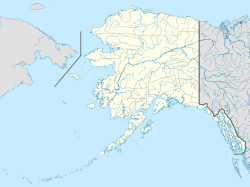Garforth Island facts for kids
| Geography | |
|---|---|
| Coordinates | 58°47′21″N 136°04′22″W / 58.78917°N 136.07278°W |
| Administration | |
|
United States
|
|
| State | Alaska |
Garforth Island is a quiet, empty island in Alaska, a state in the United States. It's part of the Hoonah-Angoon region and sits inside the amazing Glacier Bay National Park. No people live on Garforth Island, making it a peaceful home for wildlife.
Contents
Where is Garforth Island?
Garforth Island is found in a special part of Alaska. It is located south of a place called Muir Point. This point is where the Muir Inlet becomes narrower. The island is also west of a mountain named Mount Wright. Muir Inlet itself branches off to the northeast from the larger Glacier Bay.
What Does Garforth Island Look Like?
Garforth Island is mostly made of rocks and does not have many plants growing on it. It is a barren place, meaning it looks quite wild and untouched. Its rocky shores are important for many animals.
Amazing Animals of Garforth Island
Even though no people live on Garforth Island, it is full of life! Many different kinds of animals visit or live around its rocky shores.
Seals and Sea Lions
You can often spot Harbor seals and Steller sea lions resting on the rocks of Garforth Island. They come out of the water to "haul out," which means they rest and warm up in the sun. Harbor seals are smaller, while Steller sea lions are much larger and have a loud roar.
Fish in the Waters
The waters around Garforth Island are home to many types of fish. These include walleye, pollock, and capelin. You might also find Pacific sand lance, herring, and different kinds of salmon. These fish are a very important food source for other animals.
Whales, Porpoises, and Otters
Larger marine animals also swim near the island. Giant humpback whales are known to visit, often seen breaching or slapping their tails. Killer whales, also known as orcas, are powerful hunters. Smaller harbor porpoises can be seen swimming quickly through the water. Playful sea otters also live here, often floating on their backs and cracking open shellfish.
 | Jewel Prestage |
 | Ella Baker |
 | Fannie Lou Hamer |


